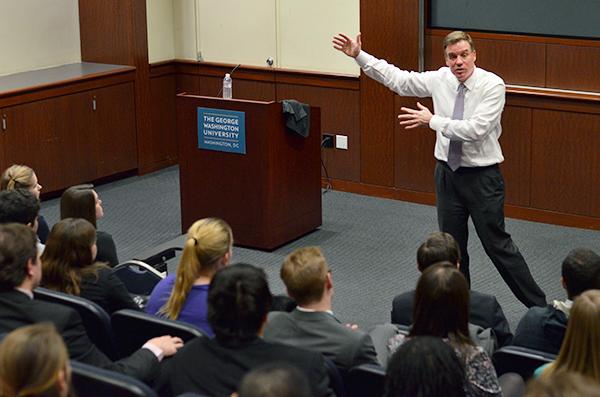The largest College Democrats chapter in the country will likely take fewer campaign trips and invite fewer high-profile politicians to speak next year after the Student Association slashed more than half of its budget.
The CDs was one of two major campus organizations to see big funding cuts after improperly submitted budget requests, while 22 groups received no SA funding.
Both the CDs and the Organization of Latino American Students earned some money back after leaders appealed the decisions last week. But the groups still lost a combined $24,000, likely forcing the groups to cut back on programming for their thousands of members.
The allocations need to be approved by the full senate on Wednesday.
Incoming CDs president Connor Schmidt said the issue stemmed from last year’s treasurer failing to provide descriptions for their expenditure requests, leaving almost one-third of the budget request blank.
Schmidt said the organization’s $16,000 budget cut could force the group to cut down on programming next spring, though it would have enough for the fall.
The group will instead rely more on co-sponsorships, fundraising and membership dues, which help pay for high-profile speaker events and campaign trips, particularly during midterms season. The organization has also discussed raising dues as a way to offset costs, though Schmidt said its not his preferred choice.

Chair of the SA Senate Finance Committee Ryan Counihan said the groups were denied funding this year due to application errors that ranged from using the wrong form to submitting incomplete requests.
The SA decided to allocate funds this year based on organizations’ line-item budget requests, stricter oversight that finance committee members argued would improve transparency.
In line with past years, the Student Bar Association received the largest allocation, about $102,046. Other large groups saw big increases in their allocations including $84,000 for Program Board, $55,000 for the Club Sports Council and $51,000 for the Medical Center Student Council.
Counihan, who helped decide nearly $900,000 worth of allocations decisions over the last two weeks, said organizations had ample opportunity to learn about the new budgeting process.
About two dozen out of 300 groups submit improper applications, and five of those groups appealed. The leftover funds – about $150,000 – were reallocated to other organizations, Counihan said.
“It was a really hard decision on our part, but we felt like it was only fair to everyone else – the vast majority who did it right and filled it out right – to reward them,” Counihan said.
The co-sponsorship fund will remain at about $150,000, which Counihan said would make it tougher for groups like the CDs competing for the extra funds.
The CDs had already relied on co-sponsorships this year to pay for speakers, on top of the group’s $32,000 allocation. Over the last two years, the group has hosted speakers like New Jersey Sen. Cory Booker and Barack Obama’s campaign strategists David Plouffe and Jim Messina.
The allocation for the OLAS dropped by more than half to $5,400 this year. The group’s leaders did not return requests for comment.
Student organizations were trained in the new allocations process in a series of mandatory workshops and townhall meetings, which were hosted by the Center for Student Engagement. Counihan said many organizations filled out their budgets with CSE staff members to ensure each form was correct.
But CSE director Tim Miller said students had ample opportunities to learn how to budget properly, but that “college is about teaching responsibilities. Sometimes you learn them from successes. Sometimes you learn them from mistakes.”
He added that students shouldn’t expect to see their budgets renewed as campus makeup and priorities shift every year.
“Groups assume they should get what they got last year, every year. There is no guarantee of the same money every year. Some have changed every year. Others change,” Miller said. “If the SA gave the same money every year, what’s the point?”
More than 100 groups had attended a day-long workshop hosted by the CSE this fall, which Miller said would continue next year rather than a series of workshops. The all-day information session, which will again be held the week before classes start, will prevent groups from falling through the cracks, said finance vice chair Ben Pryde.
“People do mess up. You can’t catch all of them, but we’re going to make it as easy and straightforward as possible,” Pryde said.
This story was updated April 17, 2014 to reflect the following:
Corrections appended
The Hatchet incorrectly identified the Medical Center Student Council as the Multicultural Student Council. The Hatchet also incorrectly identified Ben Pryde as the incoming finance chair. He is the current vice chair of the finance committee. We regret these errors.








